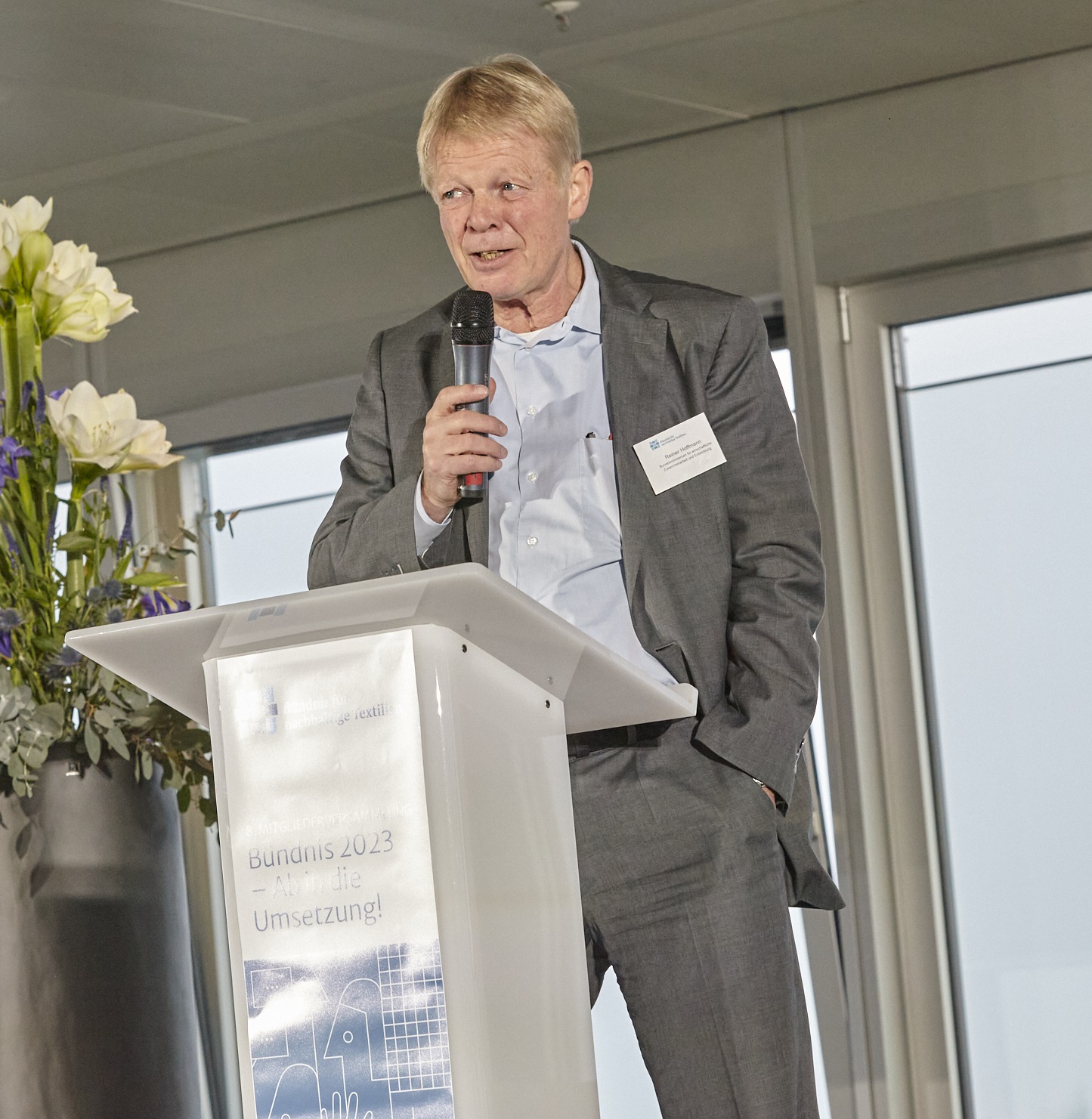Chapter 5
Decent Work Worldwide
Guest contribution by Reiner Hoffmann
Reiner Hoffmann was President of the German Trade Union Confederation (DGB) from 2014 to 2022; he has been a member of the European Economic and Social Committee (EESC) in Brussels since 2020. In September 2022, he was appointed as SDG Ambassador by German Federal Development Minister Svenja Schulze. In February 2023, he was elected Chair of the German Council for Sustainable Development (RNE).


Joining forces to do good work worldwide
I was delighted when German Federal Development Minister Svenja Schulze appointed me as SDG ambassador for good work worldwide in September 2022. Decent work, fair wages and good working conditions are a prerequisite for a life in dignity, for a life in prosperity. Only through a socially acceptable world of work can good work succeed worldwide. For this we need a sustainable transformation of global supply chains.
In 2014, I was present at the founding of the Partnership for Sustainable Textiles in my capacity as President of the German Trade Union Confederation (DGB). Today, over eight years later, I can say that the Textiles Partnership and its members have accomplished a great deal over the years. Moving forward together to achieve ambitious goals was certainly not always an easy task and it still is not easy given the multiple crises we face today, compounded by the problem of fragile supply chains. This became abundantly clear during the COVID-19 pandemic.
Nevertheless, companies, associations, NGOs, standards organisations, trade unions and the German Federal Government are all united by a common goal that they should not lose sight of, namely a socially just, environmentally friendly and corruption-free textile supply chain.
In 2022, the Textiles Partnership proved that it can keep pace with the changes in the textile and garment industry. With its new focus, it has put in place measures that will enable it not only to support companies in the ambitious implementation of legal requirements, but also to go much further and continue to do pioneering work.
I welcome the four focus topics identified by the Textiles Partnership as part of its strategic realignment.
Living wages are of paramount importance from a trade union perspective. The issue highlights the importance of freedom of association and organisation in producer countries and factories. Trade unions have a major role to play in wage negotiations. Strong unions and capable employers’ associations are fundamental to ensuring a living wage.
Gender equality is vital, particularly in a sector where most of the workers are women. Women and other vulnerable groups suffer more than others from poor working and living conditions. Targeted efforts to empower women economically as entrepreneurs, managers and employees, combined with a labour market policy that promotes gender equality, are essential measures for performing good work worldwide.
Circular economy and climate protection Companies need to think about the viability of their business models and rethink their products from scratch. This is already happening, for instance in the pilot project Recycling Product Clones. I am sure that the Partnership will continue to take ambitious steps forward – also in the context of the EU textile strategy.
Remedies and complaints mechanisms are essential for good work worldwide. They play a significant role in ensuring that human rights are protected, that social and environmental standards are met, and that remedial action is taken in the event of violations. In this respect, much has happened in the last few years, but Partnership members need to get involved, particularly in those areas where affected individuals still lack access to effective mechanisms.
In multi-stakeholder initiatives, it is vital for all stakeholders to work together as equals. Regardless of the different perspectives and interests of the stakeholder groups in the Textiles Partnership, the focus is on the achievement of goals. Often, what makes cooperation so challenging is also what adds value to multi-stakeholder initiatives: alternative workplace realities and seeing things through a different lens forces all of you to constantly re-evaluate your own standpoint and strike out on new paths that you would not have taken on your own.
Now that the new concept has been approved, it is important to take action. After all, setting ambitious goals is not enough. It is also – and above all – about implementation.
The laws we pass here in Europe are one thing. What is important, however, is to reach the people along the entire value chain. Globalisation has created wealth – but the wealth is unevenly distributed. Basic labour standards need to be met in the countries from which we buy our goods. This is the only way to achieve social justice. Our efforts must have an impact on the ground.
The Textiles Partnership follows the ‘first mover’ principle. If we show that it works, it will have a positive impact on others as well. We need to scale up the progress we have made. In this spirit, I would like to wish the Partnership for Sustainable Textiles and its members all the best and every success in the future.
Reiner Hoffmann